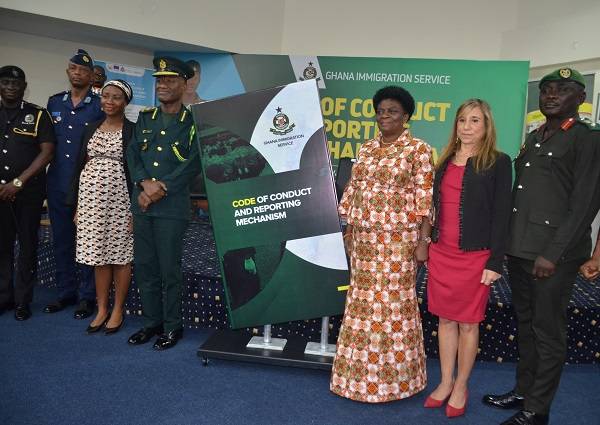
The Ghana Immigration Service (GIS) yesterday launched its Code of Conduct and Reporting Mechanism to regulate the conduct of its officers.
The manual would provide personnel of the Service and the public with a clear understanding of the principles, values, and ethical standards expected of an Immigration officer at all times.
“Every Immigration officer must acknowledge that this code regulates our conduct and must fully be complied with in a manner that demonstrates the highest degree of exemplary responsibility, ethical and professional standards required on an Officer…to maintain public confidence,” the foreword of the manual signed by the Comptroller-General of the GIS, Kwame Asuah Takyi, reads in part.
The 30-code manual enjoins personnel of the service to respect the fundamental human rights of citizens, bars them from partisan political activities, and details how property of the service could be used.
It also directs officers on confidentiality, conflict of interest, gifts and other forms of benefits, refrains them from substance abuse whilst at post, relationship with the media, commercialisation of service paraphernalia, dressing and appearance, complaints and investigations amongst others.
Launching the code in Accra yesterday, the Chief Director of the Ministry of the Interior, Mrs Adelaide Anno-Kumi, was hopeful that the manual would guide the Service in fostering discipline amongst officers in the execution of their mandate.
In a speech on behalf of the Minister, Ambrose Dery, Mrs Anno-Kumi, said the absence of a code of conduct in an organisation served as a fertile ground to nurture corrupt practices which is a drawback in the management of public perceptions.
“The adoption of this code of conduct, I know, would be instrumental in promoting integrity, openness, and transparency amongst officers of the GIS. This sends a strong signal that the GIS is committed to adhering to the highest standards of integrity and that ethical behaviour is expected from all officers.
“Let us, therefore, in our actions help the service to successfully implement this Code of Conduct and Reporting Mechanisms, by reporting unethical behaviours of officers for the bad nuts to be fished out and dealt with appropriately, so that together we can have a better Service,” Mrs Anno-Kumi charged.
For Mr Kwame Asuah Takyi, the GIS calling was about integrity and the law “therefore, respect for the law and ethics is the mark of professionalism.”
He said the respect for the basic principles which underpin the immigration profession was demonstrated by the interdiction of 27 officers of the Service about two weeks ago for their alleged involvement in recruitment and or visa fraud and other offences.
The Service, he said, had the structures in place for the effective implementation of the Code through the Immigration Professional Standards and Ethic Section which serves as an ombudsman to enforce the content of the manual.
A public campaign, he revealed, would be embarked upon with themes around ‘promoting integrity, accountability and transparency in border management’ and called personnel to regard the manual as their “Bibles and Qur’ans” henceforth.
Produced by the Technical Working Group of the GIS, it was funded by the European Union and the International Centre for Migration Policy Development.
BY JULIUS YAO PETETSI






